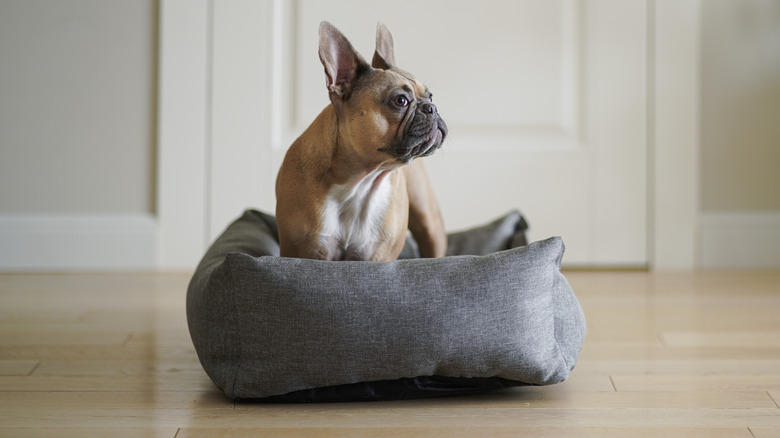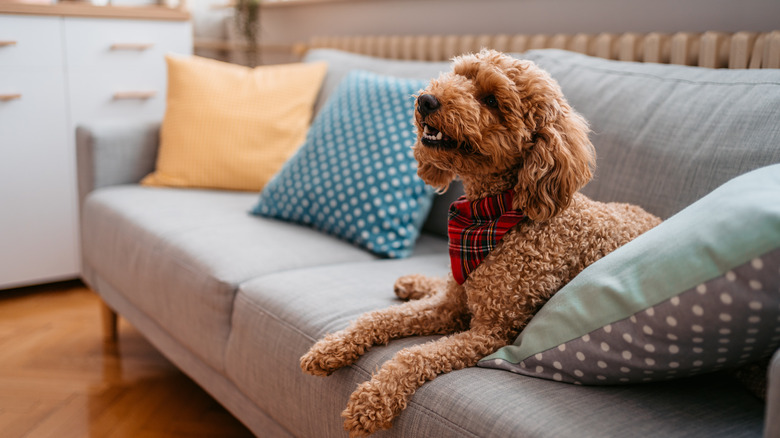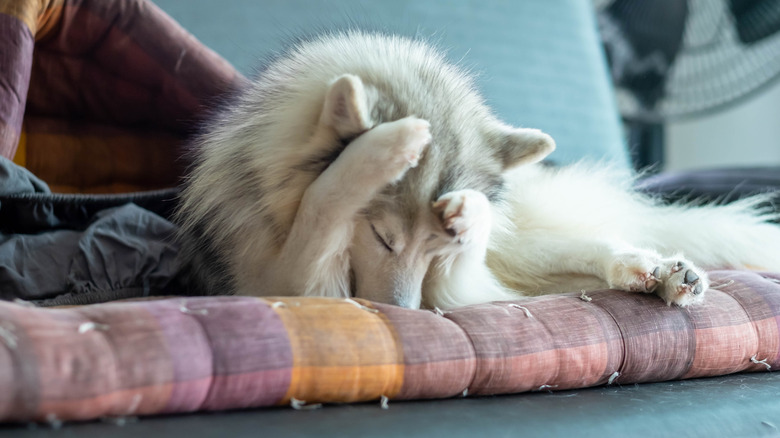The Reason Your Dog Spins In A Circle Before Lying Down
We may receive a commission on purchases made from links.
Have you ever watched your dog spin once or twice before plopping down on their bed with a little sigh? The curious canine act may have concluded with the pup snoring away as if nothing odd had just transpired. While this performance likely left you shaking your head in bemusement, it's one of many dog behaviors that seem bizarre to humans but perfectly normal to your pet.
Canines typically twirl before settling in for a snooze for two primary reasons: instinct and comfort. While health issues can also factor in and contribute to excess movement, a snug and content pup's reason for spinning often falls under the first two categories. The distant wolf ancestry of dogs and the bonds they forge with their favorite humans have come together to make this behavior one of the species' most endearing habits.
Dogs spin before lying down to satisfy their inherited survival instincts
Wolves and dogs have many similarities, including sharing an instinctual need for safety. In the case of domesticated canines, this applies even when they are curled up in their favorite spot at home. Pack animals thrive within the greater protection that a group provides, and spinning before lying down allows them to check everyone's location, along with their proximity to others. Essentially, they can only unwind once they've ensured the well-being of themselves and their pack mates, which includes you. The spin also allows the dog to claim a space, as their scent imprints on the spot where they plan to relax.
Additionally, the twirl enables a pup to follow their nose and point themself in the safest direction to address any threats. While a house dog doesn't typically need to worry about snakes or other predators, spinning still sets them up to react quickly to any situation that may arise. Canines have a whopping 300 million scent receptors (their owners only have 6 million). They process a lot of information through their noses as a result, so proper placement for maximum scent detection makes sense.
When humans get ready for bed, they seldom just flop in one spot and fall asleep; everyone has their preference for pillows, blankets, and how they want to position themselves. Dogs also consider comfort essential; they want everything to be perfect before settling down. In nature, making a little nest can help control a canine's temperature by digging into a cold spot or deep soil to help keep them warm. Domesticated dogs mirror this act through digging and spinning in their beds, even though they are safely ensconced indoors.
Signs that spinning may indicate a mental or physical issue
While dogs naturally spin before settling into their favorite spot, owners may have cause for concern if their pup does so more than usual or the act comes with other symptoms. Signs to look out for include persistent circling, not responding to stimuli, changes in sleeping and eating habits, or showing other compulsive behaviors, per Wag.
Excessive spinning can signify anxiety stemming from a range of sources, such as fireworks and other loud noises or boredom. Stress manifests in canines in multiple ways. Giving them treats designed to help dogs relax, such as Greenies Supplements Calming Chews, may provide some relief. Redirecting their focus with positive activities could also prove useful. Additionally, a veterinarian may recommend one of several prescriptions to help deal with more chronic stress or anxiety.
If your pup tilts their head in addition to circling excessively, they could have an ear infection. Conditions such as liver disease, tumors, or the onset of dementia can also cause a dog to pace and/or spin more than usual. Many pet parents will recognize excessive or unnatural behavior from their canine and should address any concerns they have with a veterinarian.


